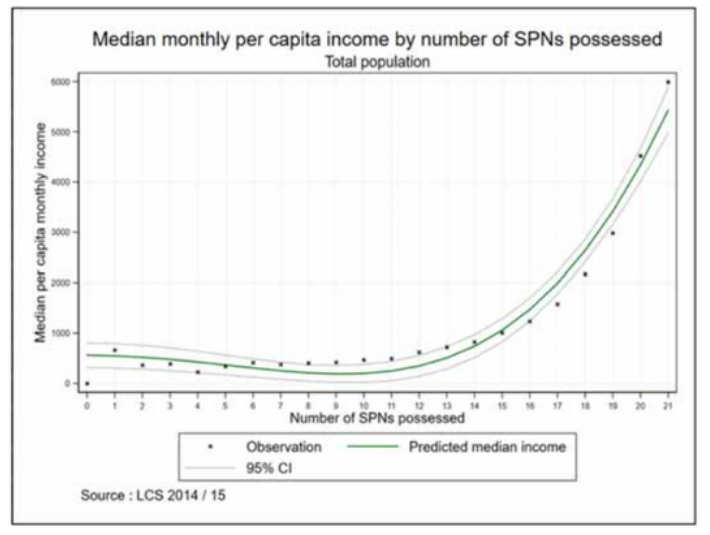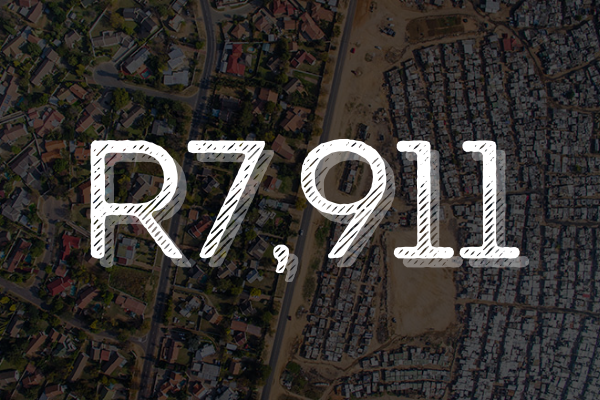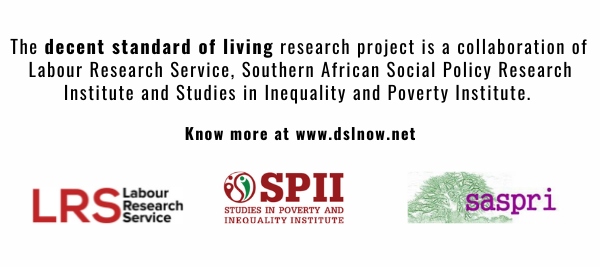The Decent Standard of Living is a money amount that represents the median monthly income required to access a collection of goods and services.
South Africa is one of the most unequal societies in the world, with half of the population living below the poverty line. Despite our backgrounds, the majority of us agree on what constitutes a decent standard of living.
First piloted in 2006, the Decent Standard of Living Measure was conducted telephonically among a representative sample in five South African provinces over the course of the Covid-19 pandemic. It determined that South Africans across a spectrum of socio-economic backgrounds viewed 34 Socially Perceived Necessities (SPNs) as a benchmark for a decent standard of living.
The survey was based on an established measurement model comprising 50 key attributes relating to personal belongings, access to community-based services, activities and relationships with family and friends. These SPNs range from a free-standing home that is strong enough to withstand the weather to access to a cell phone and supermarket in their local neighbourhood.
The cost of these 34 SPNs is R7,911 for each person, according to research partners Studies in Poverty and Inequality Institute (SPII), Labour Research Service (LRS) and Southern African Social Policy Research Insights (SASPRI).
“South Africa is a deeply unequal society. Yet, despite these inequalities and high levels of poverty, most South Africans are clear on what the bare minimum is to achieve a decent life,” says Dr Nqobile Zulu, Research Manager at SPII.
“We are also the most unemployed nation in the world, with many of the working-age population, particularly women and youth, experiencing some form of long-term unemployment. This means that we need more radical economic intervention from our government if we are ever to achieve our Constitutional ambition of the right to dignity.
“We hope that the results of the study will be used to inform policy formulation in the fight against poverty and that stakeholders from all spheres will focus efforts on bridging the gap between the haves and have-nots. South Africa needs focused investment, particularly in communities that are left on the periphery to enable greater cohesion and equality,” says Dr Zulu.
If you have all this, you have a decent standard of living:
- Mains electricity in the house
- Someone to look after you if you are very ill
- A house that is strong enough to stand up to the weather, e.g. rain, winds, etc.
- Street lighting
- A fridge
- Clothing sufficient to keep you warm and dry
- For parents or other carers to be able to buy complete school uniform for children without hardship
- A flush toilet in the house
- Paid employment for people of working age
- Somewhere for children to play safely outside of the house
- A cell phone
- People who are sick are able to afford all medicines prescribed by their doctor
- Having police on the streets in the local area
- Separate bedrooms for adults and children
- A neighbourhood without rubbish/ refuse/ garbage in the streets
- Having an adult from the household at home at all times when children under ten from the household are at home
- A fence or wall around the property
- Someone to transport you in a vehicle if you needed to travel in an emergency
- Burglar bars in the house
- Ability to pay or contribute to funerals/ funeral insurance/ burial society
- Being able to visit friends and family in hospital and other institutions
- Tarred roads close to the house
- Regular savings for emergencies
- A place of worship (church/mosque/synagogue) in the local area
- A large supermarket in the local area
- A bath or shower in the house
- Someone to talk to if you are feeling upset or depressed
- A neighbourhood without smoke or smog in the air
- Television / TV
- Someone to lend you money in an emergency
- A sofa/lounge suite
- Meat or fish or vegetarian equivalent every day
- A radio
- A lock-up garage for vehicles
In 2018, the decent standard of living amount was R7 043 per person per month. This amount increased to R7,541 per person per month in 2020.
READ: Is this what a decent life looks like?
READ: There are more ways to live a decent life than just through money
Median monthly per capita income by number of socially perceived necessities in 2014/15

Watch: Livestream of the 6th Annual Colloquium on a Decent Standard of Living | 30th September 2021








